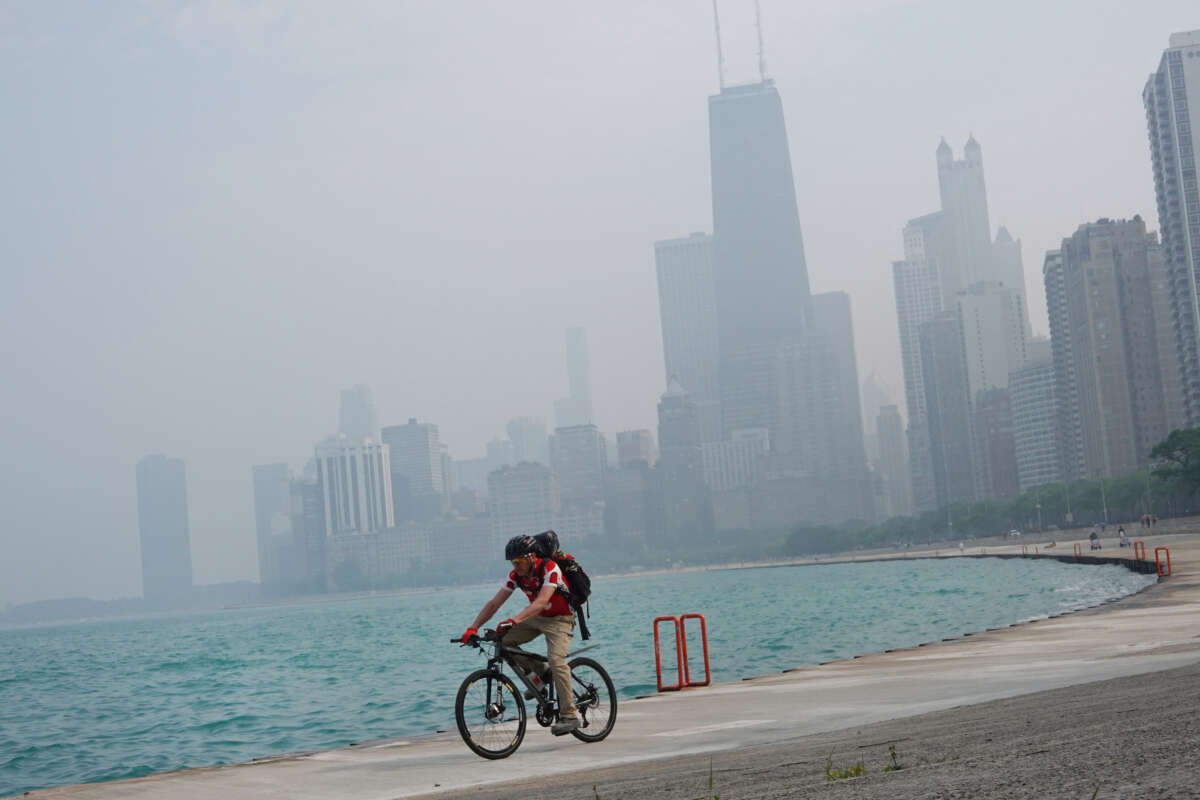More than 120 million people across the U.S. — over a third of the country’s population — were living under air quality alerts as of late Wednesday as smoke from hundreds of out-of-control Canadian wildfires blanketed much of the Northeast and the Midwest, temporarily leaving Detroit and Chicago with the most polluted air in the world.
Michigan’s air quality alert was extended through Thursday “as weather forecasters expected low-level winds to change direction, potentially resulting in more smoke and reduced visibility as a result of the Canadian wildfires,” the Detroit Free Press noted Wednesday.
Residents of Michigan and other U.S. states reported smelling burning plastic, prompting toxicologists at Michigan’s Department of Environment, Great Lakes, and Energy to observe that “wood fires emit a lot of volatile organic compounds (VOCs),” most of which “are noticeable to our noses as the familiar ‘campfire’ smell, but they break down quickly when exposed to UV radiation from sunlight.”
“Other VOCs like benzene, formaldehyde, and acrolein are also released and they outlast the ‘campfire’ VOCs,” the state officials said. “It’s these chemical compounds that you’re smelling as the smoke wafts around for a few days and settles to the ground and reaches your nose.”
Dr. Glen Clark, emergency center chief at Corewell Health’s Beaumont Hospital in Grosse Pointe, Michigan, said in a statement to the Free Press that his medical center has seen “a significant increase in respiratory complaints” over the past week.
“We’ve seen both asthma and COPD patients, who have been well controlled, presenting with exacerbations requiring an increase in use of asthma medications, including rescue inhalers,” said Clark. “Even otherwise healthy individuals have come in complaining of chest tightness.”
As of Thursday morning, the Swiss firm IQAir ranked Chicago and Detroit as the cities with the worst air quality in the world. Minneapolis briefly cracked the top five the previous day.
CNN reported Wednesday that “Chicago asked all residents—especially those with heart or lung disease, older adults, pregnant people, and young children—to avoid outdoor activities and protect themselves from exposure.”
“Chicago Public Schools and camps are also moving activities indoors, city officials said in a news release,” the outlet added. “About 11 miles away, Evanston, Illinois closedall swimming beaches and canceled a concert Tuesday due to the poor air quality, the city said on Facebook, asking residents to limit outdoor exposure through Wednesday.”
Poor air quality due to smoke from Canadian wildfires will continue through Thu. Everyone should avoid prolonged outdoor activities and those w/chronic respiratory issues should stay indoors if possible. See https://t.co/N5S58sVQNn for additional forecasts & safety information. pic.twitter.com/SVDLho8Duj
— NWS Chicago (@NWSChicago) June 28, 2023
As air quality deteriorated across Northeast and the Midwest, the U.S. South and Southwest experienced scorching temperatures, with at least nine people dying of heat-related causes in Texas.
“This is what we’ve been warning about… more extreme heat linked to the climate crisis,” the youth-led Sunrise Movement tweeted Wednesday.
“We need to declare a climate emergency,” the group added, reiterating a longstanding demand that President Joe Biden has thus far rejected.
Late Wednesday afternoon, the National Weather Service (NWS) wrote on social media that “dangerous heat persists for much of the southern U.S.,” where tens of millions of people are living under heat advisories.
“Heat is the leading cause of weather-related fatalities each year,” the agency stressed. “Take it seriously.”
The Washington Post reported that “much of the United States felt like a blazing inferno on Wednesday, as record heat attacked the South like a blowtorch, thick smoke from Canadian wildfires blanketed the Great Lakes region, and triple-digit temperatures threatened to wallop California for the first time this year.”
“Scientists said climate change helped shape the weather conditions that were causing misery and putting lives at risk from Mexico to Canada,” the Post added. “There was no disputing the impact: If it wasn’t way too smoky, it was way too hot.”
Lead headline tonite on the Washington Post–and for much of the rest of the century pic.twitter.com/J8gyiS8giQ
— Bill McKibben (@billmckibben) June 29, 2023
“Texas is seeing a heatwave so deadly that the state is breaking all-time records for energy usage,” the Institute for Policy Studies wrote Wednesday. “Detroit, Chicago, and Minneapolis are among the four cities with the worst air quality in the world due to [Canada wildfire] smoke. “We can’t afford to wait. Climate action now.”
We have 3 days to raise $33,000 — we’re counting on your support!
For those who care about justice, liberation and even the very survival of our species, we must remember our power to take action.
We won’t pretend it’s the only thing you can or should do, but one small step is to pitch in to support Truthout — as one of the last remaining truly independent, nonprofit, reader-funded news platforms, your gift will help keep the facts flowing freely.
